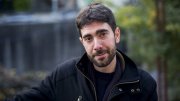Growing up in Northampton, Massachusetts, novelist David Leo Rice ’10 sensed there was something lurking beneath the surface of things. Meandering through the aisles of his local video store, he was convinced the VHS tapes were portals to other worlds. At the now-defunct Words and Pictures Museum—devoted to comic books, cartoons, and graphic novels—he wondered whether the images on display depicted not imagined realms, but existing ones. “What if there’s a real world that actually looks like that?” he remembers thinking. And if there were, how could he get there?
On one visit to the museum, when he was four or five, he wandered away from his ba-bysitter and stumbled into a strange room, where he found himself surrounded by cartoon images and unfamiliar adults towering high above. For a moment, his suspicion was confirmed: he’d crossed over into the hidden world.
Soon, Rice began channeling that intuition into storytelling. “Storytelling is about exploring the unknown,” he says, “trying to go places, even in your own mind, where there’s some taboo, something holding you back from going.” With a childhood friend, he made up tales about which of their teachers were aliens and which were robots; once he could write, he moved those stories to the page. Now an author, Rice has written several novels and story collections that trace the journeys of drifters and seekers through surreal, dreamlike landscapes. He blends elements of speculative fiction and sci-fi to ask the question that has obsessed him since childhood: what lies just out of view?
Harvard provided a place to begin looking. In a class with Cabot professor of English Nicholas Watson, Rice learned about the medieval “visionary tradition”: the saints, mystics, and children who claimed to see godly or demonic presences. Rice was struck by how vivid—and familiar—that world felt. “There’s something within [the medieval tradition] that is much wilder and weirder than what came after it,” he says. He was living in a post-Enlightenment age, when people believed history was over, time moved in one direction, every phenomenon had a cause. “But I had this sense—which unfortunately has gotten truer—that something really strange was moving through the world,” he says.
The so-called Dark Ages, with porous boundaries between vision and reality, offered a lens for analyzing the modern world that “felt intuitively right.” Rice pursued a special concentration called “Esoteric Studies: Mysticism and Modernism in Western Thought,” comparing medieval works to those of modernist authors like William Faulkner, Franz Kafka, and Bruno Schulz, the Polish-Jewish author of The Street of Crocodiles (1934). Schulz’s writing, Rice says, carried a “pre-Holocaust feeling”—a sense of some vast and terrifying force stalking, invisible, through the world. The medieval context provided a framework to explore those unseen forces shaping the present.
Harvard also expanded Rice’s sense of what literature could be—not just in content, but in form. In a freshman year animation class, he learned that many animators save time by reusing a static background in multiple frames, redrawing only the moving figures. But Rice preferred the more labor-intensive method: drawing the background and characters together, in every frame. “They’re all part of the same image, and each one is impacting the other,” he says. That approach would later shape how he constructs fictional worlds. “In a lot of my stories, the place is the character,” he says—there’s no disentangling the two. “Who we are is always based on where we are.”
After graduation, Rice spent a year in Berlin on a traveling fellowship. He remained in a “fugue state” the whole time, he says, writing what would become his novel Angel House, in which the world is a vast ocean, empty of people or places. The protagonist, Professor Squimbop, sails a ship called Angel House. Whenever he drops an anchor, a town sprouts out of the sea, and the people who emerge have memories of always living there. It was a sort of written analog of his animation technique. “The characters’ sense that they’re living their own lives in this town is somewhat of an illusion,” he explains. “They’re an emergent principle of the place—as much as the trees or the roads or anything else. They’re not actually more conscious than the things around them.”
Angel House remains one of the works closest to Rice’s heart. It was also, he says, the most difficult to wrangle into coherence. During his fellowship, “I produced an insane amount of text without any kind of plan,” he says. “It sounds strange to say, but it took me longer to read than to write it. I couldn’t get through it once I had written it.”
Afterward, he returned to Harvard to work as a teaching fellow in animation. He decided to set Angel House aside and start something new. The result was A Room in Dodge City, which follows a nameless drifter through a nightmarish version of the real Kansas town. “I told myself I was just going to write something else—with no notes,” he says. “That was my only rule.”
That looseness proved liberating. It gave him a sense of lightness and momentum, and he realized that no single work had to contain every idea he had for a story. In 2017, he published the first volume of A Room in Dodge City. That gave him the experience he needed to finish Angel House, which he published in 2019. By then, Rice had moved to New York and begun teaching writing, at the Gotham Writers Workshop, Parsons, and the Fashion Institute of Technology, and now at a nursing college in Harlem.
His most recent work, The Berlin Wall, continues his exploration of surreal worlds shaped by history and place. Set in an alternate Europe in 2020, it imagines the Berlin Wall coming back to life, its pieces reassembling and even possessing people. The novel explores how the past continues to haunt the present, unpacking many people’s nostalgia for a time when borders were clear and when good and bad felt more distinct. The uncanny tension Rice sensed as a child in Northampton now feels less like youthful imagination and more like early intuition. For him, works like The Berlin Wall offer a way of navigating that uneasiness, creating new forms from the familiar energy that’s stirring in the world once again.









